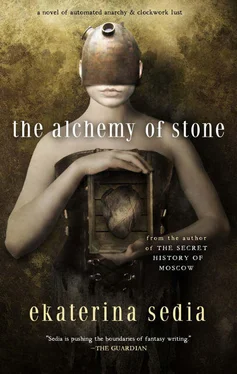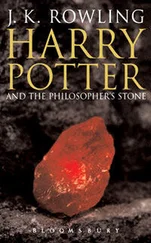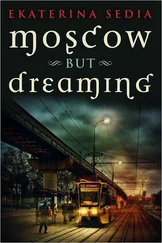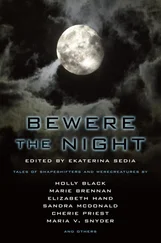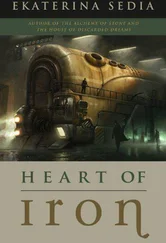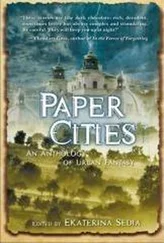Ekaterina Sedia
THE ALCHEMY OF STONE
We scale the rough bricks of the building’s facade. Their crumbling edges soften under our claw-like fingers; they jut out of the flat, adenoid face of the wall to provide easy footholds. We could’ve used fire escapes, we could’ve climbed up, up, past the indifferent faces of the walls, their windows cataracted with shutters; we could’ve bounded up in the joyful cacophony of corrugated metal and barely audible whispers of the falling rust shaken loose by our ascent. We could’ve flown.
But instead we hug the wall, press our cheeks against the warm bricks; the filigree of age and weather covering their surface imprints on our skin, steely-gray like the thunderous skies above us. We rest, clinging to the wall, our fingertips nestled in snug depressions in the brick, like they were made especially for that, clinging. We are almost all the way to the steep roof red with shingles shaped like fish scales.
We look into the lone window lit with a warm glow, the only one with open shutters and smells of sage, lamb, and chlorine wafting outside. We look at the long bench decorated with alembics and retorts and colored powders and bunches of dried herbs and bowls of watery sheep’s eyes from the butcher’s shop down the alleyway. We look at the girl.
Her porcelain face has cracked—a recent fall, an accident?—and we worry as we count the cracks cobwebbing her cheek and her forehead, radiating from the point of impact like sunrays. Yes, we remember the sun. Her blue eyes, facets of expensive glass colored with copper salts, look into the darkness, and we do not know if she can see us at all.
But she smiles and waves at us, and the bronzed wheel-bearings of her joints squeak their mechanical greeting. She pushes the lock of dark, dark hair (she doesn’t know, but it used to belong to a dead boy) behind her delicate ear, a perfect and pink seashell. Her deft hands, designed for grinding and mixing and measuring, smooth the front of her fashionably wide skirt, and she motions to us. “Come in,” she says.
We creep inside through the window, grudgingly, gingerly, we creep (we could’ve flown). We grow aware of our not-belonging, of the grayness of our skin, of our stench—we smell like pigeon-shit, and we wonder if she notices; we fill her entire room with our rough awkward sour bodies. “We seek your help,” we say.
Her cracked porcelain face remains as expressionless as ours. “I am honored,” she says. Her blue eyes bulge a little from their sockets, taking us in. Her frame clicks as she leans forward, curious about us. Her dress is low-cut, and we see that there is a small transparent window in her chest, where a clockwork heart is ticking along steadily, and we cannot help but feel resentful of the sound and—by extension—of her, the sound of time falling away grain by grain, the time that dulls our senses and hardens our skins, the time that is in too short supply. “I will do everything I can,” she says, and our resentment falls away too, giving way to gratitude—falls like dead skin. We bow and leap out of the window, one by one by one, and we fly, hopeful for the first time in centuries.
Loharri’s room smelled of incense and smoke, the air thick like taffy. Mattie tasted it on her lips, and squinted through the thick haze concealing its denizen.
“Mattie,” Loharri said from the chaise by the fireplace where he sprawled in his habitual languor, a half-empty glass on the floor. A fat black cat sniffed at its contents prissily, found them not to her liking, but knocked the glass over nonetheless, adding the smell of flat beer to the already overwhelming concoction that was barely air. “So glad to see you.”
“You should open the window,” she said.
“You don’t need air,” Loharri said, petulant. He was in one of his moods again.
“But you do,” she pointed out. “You are one fart away from death by suffocation. Fresh air won’t kill you.”
“It might,” he said, still sulking.
“Only one way to find out.” She glided past him, the whirring of her gears muffled by the room—it was so full of draperies and old rugs rolled up in the corners, so cluttered with bits of machinery and empty dishes. Mattie reached up and swung open the shutters, admitting a wave of air sweet with lilac blooms and rich river mud and roasted nuts from the market square down the street. “Alive still?”
“Just barely.” Loharri sat up and stretched, his long spine crackling like flywheels. He then yawned, his mouth gaping dark in his pale face. “What brings you here, my dear love?”
She extended her hand, the slender copper springs of her fingers grasping a phial of blue glass. “One of your admirers sent for me—she said you were ailing. I made you a potion.”
Loharri uncorked the phial and sniffed at the contents with suspicion. “A woman? Which one?” he asked. “Because if it was a jilted lover, I am not drinking this.”
“Amelia,” Mattie said. “I do not suppose she wishes you dead.”
“Not yet,” Loharri said darkly, and drank. “What does it do?”
“Not yet,” Mattie agreed. “It’s just a tonic. It’ll dispel your ennui, although I imagine a fresh breeze might do just as well.”
Loharri made a face; he was not a handsome man to begin with, and a grimace of disgust did not improve his appearance.
Mattie smiled. “If an angel passes over you, your face will be stuck like that.”
Loharri scoffed. “Dear love, if only it could make matters worse. But speaking of faces… yours has been bothering me lately. What did you do to it?”
Mattie touched the cracks, feeling their familiar swelling on the smooth porcelain surface. “Accident,” she said.
Loharri arched his left eyebrow—the right one was paralyzed by the scar and the knotted mottled tissue that ruined half of his face; it was a miracle his eye had been spared. Mattie heard that some women found scars attractive in a romantic sort of way, but she was pretty certain that Loharri’s were quite a long way past romantic and into disfiguring. “Another accident,” he said. “You are a very clumsy automaton, do you know that?”
“I am not clumsy,” Mattie said. “Not with my hands.”
He scowled at the phial in his hand. “I guess not, although my taste buds beg to differ. Still, I made you a little something.”
“A new face,” Mattie guessed.
Loharri smiled lopsidedly and stood, and stretched his long, lanky frame again. He searched through the cluttered room until he came upon a workbench that somehow got hidden and lost under the pile of springs, coils, wood shavings, and half-finished suits of armor that appeared decorative rather than functional in their coppery, glistening glory. There were cogs and parts of engines and things that seemed neither animate nor entirely dead, and for a short while Mattie worried that the chaotic pile would consume Loharri; however, he soon emerged with a triumphant cry, a round white object in his hand.
It looked like a mask and Mattie averted her eyes—she did not like looking at her faces like that, as they hovered, blind and disembodied. She closed her eyes and extended her neck toward Loharri in a habitual gesture. His strong, practiced fingers brushed the hair from her forehead, lingering just a second too long, and felt around her jaw line, looking for the tiny cogs and pistons that attached her face to the rest of her head. She felt her face pop off, and the brief moment when she felt exposed, naked, seemed to last an eternity. She whirred her relief when she felt the touch of the new concave surface as it enveloped her, hid her from the world.
Читать дальше
